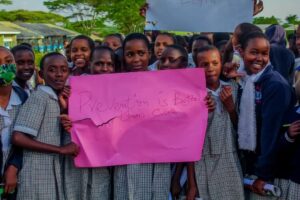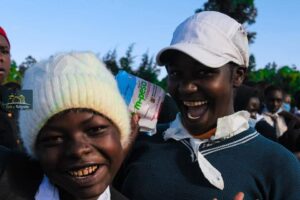Championing Maasai girls' rights: Q&A with Tareto Africa
Written by Olivia Nater | Published: April 7, 2023
Through our Global Partners program, Population Connection supports a growing number of grassroots organizations around the world working to increase access to education, public health and family planning services. Their efforts make a vital difference in their local communities and represent the “final step” in our shared work to make the world a more just and sustainable place for everyone.
Get to know our wonderful partners in this Q&A series! Here we talk to Leshan Kereto, Founder of Tareto Africa, a small organization based in Narok County, Kenya, that is working to promote reproductive health and rights and eliminate harmful practices including female genital mutilation (FGM), gender-based violence (GBV), and child marriage.
What prompted you to start your organization?

My passion for social justice was fully born in 2017. A story told to me by Joyce, a Maasai girl-leader, of a 12-year-old girl who had been subjected to FGM in Narok County, birthed in me the need to push for girls and women not to be subjected to this extreme violation of human rights. Joyce is someone I hold in high regard because of her role in shaping our approach to the sexual and reproductive health of girls. Her role as a team leader at the village level has contributed to our impact on the sexual and reproductive health needs of hundreds of girls in her village.
No one had informed this 12-year-old girl about the painful procedure she would go through, the healing process, and how it would change her life. Without her consent, she was mutilated and her family would later tell her that she was “clean” and “marriageable.” I needed to understand what would make a parent subject their child to such a violation, so I took a closer look into my community. I realized that this girl was not the only one with such a painful experience — thousands of young girls aged between nine to 14 years had been subjected to FGM, and others had been married off to men as old as 50 years.
I could not help but wonder how many girls had been cut, and how many are being cut. How many girls have been married off? How many girls have dropped out of school? How many girls have disappeared and will never be reached? This story opened my eyes to how FGM has a huge impact on the life of young girls because it makes them “ripe” for marriage at a tender age, and this immediately puts them into a new world without education or the means to make a living, leading to extreme poverty.
In Kenya, around four million women (or one in every five women) have been subjected to FGM. Maasai Community, Narok, is mainly occupied by Indigenous Maasai, and has one of the highest FGM prevalence rates in the country, at 78%. There was no other choice; I had to join the fight against FGM to protect girls in my community.
Months later, I founded Tareto Africa and designed our thematic areas to transform harmful cultural practices, particularly FGM and child marriage, and promote the sexual and reproductive health and rights (SRHR) of girls, women, and young people. To date, I have been very intentional about sounding the alarm necessary in the fight to end FGM and other harmful cultural practices, equipping young girls with the tools necessary to fight for their rights, approaching SRHR with inclusive programs, and promoting empathy and tolerance where taboos and discrimination against women and girls continue to lock many girls out of education and prevent them to live with dignity.
What programs or projects are you currently working on?
Currently, we are mainly focusing on a project dubbed “Trees for Girls,” which aims to provide generations of young girls and women with access to correct SRHR information and friendly services in drought-free environments, by mitigating the effects of climate change through our girl-led environmental conservation efforts.

The progress towards eradicating FGM has been greatly affected by global issues, mainly climate change. It is heartbreaking to see the progress we have made move backward, the attention turning elsewhere, the momentum slowing down and the money redirected. Narok County is one of the counties in Kenya that has been hit hard by climate change. Due to prolonged seasons of drought, livestock has been wiped out and people have lost their livelihoods — a situation that has forced many organizations and the Kenyan government to shift their focus to food security. However, drought has led to an increase in FGM and child marriages. Loss of income has pushed families to marry off girls so that they may receive food and security as a result of the union and secure a dowry to help support the rest of the family and have fewer mouths to feed. And since, in the Maasai community, a girl has to be mutilated to get married (FGM signifies a girl’s transition into womanhood), FGM rates have risen as well.
Child marriage is closely linked to teen pregnancy and is the leading cause of school dropout in Narok. Additionally, during drought crises, these girls are not able to access the prenatal and delivery care they need to have safe pregnancies.
As such, climate change and food security cannot be tackled in isolation. We have to acknowledge the role the climate crisis plays in the violation of women’s rights and lack of access to sexual health reproductive services. Even though food aid helps mitigate the adverse effects of drought, there is a need for further attention in the long term. The effects of climate change are expected to increase over the remainder of this century. However, the scale of longer-term impacts, in the 21st century and beyond, will depend on the rate at which greenhouse gas emissions are reduced. Trees for Girls, in partnership with nurses, schools, and environmentalists, will train 500 girls on SRHR and environmental conversations to help youths and women to realize their SRHR and boost their capacity to engage in climate change adaptation actions. The trained girls will serve as champions of Tareto Africa and will raise awareness in the community of the linkages between climate change, gender, and SRHR.
We will also plant trees to increase the vegetative plantation coverage in Narok County by 30% within the informal, hard-to-reach regions. The trees will help prevent soil erosion and drought in the long term, provide breeding habitats for farm animals, increase the source of income to the community, and build social accountability; eventually contributing to the biodiversity that keeps our world healthy and safe.
What do you hope to achieve in the next five years?
In the next five years, we hope to grow to a bigger organization whose projects benefit more people. We hope to provide education scholarships to up to 150 girls and to educate 20,000 girls across the country on sexual and reproductive health. We also hope to establish our own center to rescue girls from child marriage and FGM and to provide digital skills training for up to 1,000 young women alongside small grants to utilize digital skills to make a living.
What have been some of the greatest challenges you have faced?

Financing our projects has always been a big challenge as our interventions are community-based and -led and therefore not many organizations relate and see the innovations that we develop. There is limited support from the government, and many potential funders have strict financing policies that make it hard for us to benefit.
We have also faced the challenge of acquiring staff members with the right qualifications to enable us to run all programs efficiently. This is due to our limited funds which restrict the number of staff that we can hire and sustain.
Deeply rooted social norms and customs have also been a major challenge to achieving transformative change and eliminating harmful practices like FGM and child marriage. However, our interventions have allowed us to make progress over time and we are glad that the community is gradually adapting to our interventions.
What are you most proud of?
We are proud to have the opportunity to have a direct impact on the lives of the girls and women we support. We have the honor to walk their journey of transformation with them and help create a world that respects them and provides them with a chance to grow and thrive. We are proud that our impact is felt at the grassroots level and that our efforts reach the most vulnerable and the neediest in society. We do not take this for granted but do it diligently knowing that what we do is central to the people we help.
Anything else you’d like to share with Population Connection members?
We are happy to partner and work together with other Population Connections partners from Kenya.
To learn more about Tareto Africa, follow them on Facebook, Instagram and Twitter!

